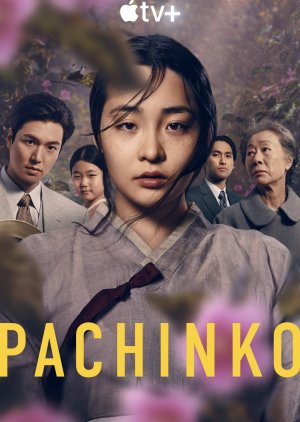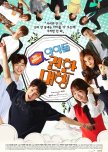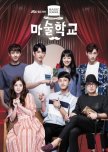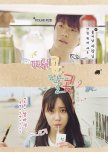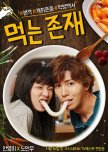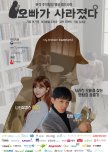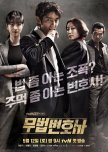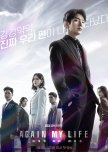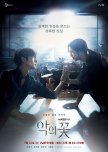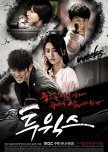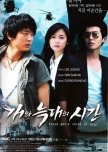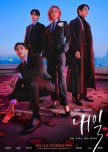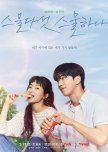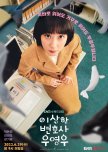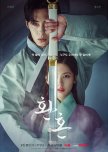
Storia bella e struggente,vera ma serve la seconda stagione!
Un drama tratto da un libro e da una storia vera perciò sulla storia c'è poco da dire,una storia pesante che ricorda la vita in un periodo storico che la corea ancora sta ricordando con dolore.Il drama è un capolavoro per quanto riguarda tutto l'insieme per l'ambientazione, costumi e colori,personaggi egregiamente interpretati praticamente da tutti gli attori.Però non è il mio genere perciò ho un po' faticato a guardarlo però alla fine ne vale la pena,e soprattutto il finale lascia un bel po' di domande che spero la seconda stagione avranno risposta.
Non è sicuramente un drama leggero e serve un po' di attenzione per poter capire i salti temporali continuo che un po' confondono.Sinceramente è più un film lungo 8 puntate che un drama.
Questa recensione ti è stata utile?

"She'll thrive, and through her a family will endure."
In her 2007 novel “The Sweet Far Thing”, Libba Bray has says, “There is an ancient tribal proverb I once heard in India. It says that before we can see properly we must first shed our tears to clear the way.” Indeed, our past is what holds us back from things that we wish to accomplish, but what matters is how we learn, acknowledge and grow as better human beings from it. We are healed of a suffering only by experiencing it to the entire. There is no beauty in sadness, no honour in suffering, no growth in fear and no relief in hate; it’s just a waste of perfectly good happiness. “Pachinko” depicts all that through the saga of a family over generations."Pachinko (パチンコ)" is a Japanese gambling device resembling a pinball machine but with automatic payoff as in a gambling slot machine (merriam-webster). Pachinko parlors are widespread in Japan, and, mostly owned by Korean immigrants, and usually also feature a number of slot machines so these premises resemble and operate similarly to western casinos. Modern pachinko machines have both mechanical & digital components. As stated by the writer, Pachinko, in the show, is depicted as a metaphor to life, when it's very unfair to go ahead, but you still continue to play, because you can't turn back or give up either. Pachinko is a game of chance and survival, both figuratively and literally.
Created by Soo Hugh and co-directed by Justin Chon & Kogonada, "Pachinko (2022) is an American show from Apple TV+, adapted from the original book of the same title authored by prominent Korean-American writer Lee Min Jin, released in 2017. Co-produced by 3 companies: Media Res, A Han.Bok Dream and Blue Marble Pictures, it's a 4 year long project, that started with Apple Inc. acquiring the bid for the series in 2018. The production took 7 months for casting and all of the cast were in fact auditioned and chosen, as informe by the team. The filimng started in October 2020, and was done in different phases, at different locations, and in fact different countries (South Korea, Japan, USA and Canada), that ended in April 2021. Reportedly, the showrunner Hugh has the objective of creating 4 seasons in total, which gives us the idea that the show we just finished is apparently one-fourth of the original novel.
"Pachinko (2022)" follows the mettlesome multigenerational chronicle of a single family, in parallel, who are immigrants of Japanese invasion & colonization in Korea. Their pursuit for survival and happiness, with hopes & dreams have led them to prosper and thrive over decades though their foregone days of sufferings and scars from the past remain fresh in their hearts. The show presents stories from different timelines from 1910 to 1989.
Kim Sun Ja (later Baek Sun Ja/Bando Nobuko) is played by 3 actors: Jeon Yu-na (childhood), Kim Min Ha (teeange), Youn Yuh Jung (Old), whom the author keeps at the centre of everything that takes place throughout. Steven Noh plays Pastor Baek Yi Sak (Sun Ja's husband) while Soji Arai (Korean name: Park So Hee) is in the role of Baek Mo Se/Bando Mozasu (Sun Ja's son) and Jung In Ji takes part as Yang Jin (Sunja’s mother). Ko Han Su (Lee Min Ho) is a cold-hearted fishmonger with a dark past and plays an important fuelling factor that impacts Sunja’s life. Baek Yo Seb (Han Joon Woo) and Choi/Baek Kyung Hee (Jung Eun Chae) are brother & sister-in law of Sunja, respectively. Baek Solomon (adult: Jin Ha and young: Yoon Kyung Ho) is Sunja’s grandson from Mozasu, who is an efficient employee in a top corporate bank in New York. Etsuko (Kaho Minami) is Mozasu’s girlfriend whereas Naomi (Anna Sawai) is Solomon’s collegue.
The opening was the highlight of the TV series and definitely a favourite. While looking at the opening credits, it’s unclear whether this is a Korean, Japanese or Western drama; the main cast members gathered in a scintillating & evocatively coloured pachinko parlour as if it were a paradise, dancing to "Let's Live for Today" by The Grass Roots. This is the only time the actors from different timelines intersect, which was mainly due to Hugh’s love for opening credits.
“A child is coming. This one will thrive, I assure you. And through her, a family will endure.” : describing the birth of Sunja, the central character, this line epitomizes the pneuma of Pachinko’s premiere. In contrast to the book, which is ordered chronologically from the 1930s to the late 1980s, the filmmakers of this series made a bold change. The nonlinear construction of time in the series jumps between past and present.
“Pachinko” tells us a spellbinding story of colonialism & subcultural nationalism, war & peace, love & loss, and victory & sorrow, exclusively from a meta-historical human perspective. The historical accuracy and the detailed representation of adversities experienced by the people of Korea, due to the brutal consequences of a ruler's greed, is of immense value and definitely deserve all the noble words that exist in the world. From making aware the contemporary generation about their history to generating nostalgia & cognizance in viewers by enabling them to look back and consider the affinities between realities of different times, Pachinko does all that, if not more.
Enumeration of Sunja’s journey particularly feels nostalgic yet melancholic as it serves as a reminder of the wartime and post-war stories of 1st generation Koreans and their descendants. The nuance of these memories, however, forces us to acknowledge what they’d, in truth, gone through in the course of history and how it affects the current Zainichi Korean generation. It also shows us how resilient and strong people can be despite what life throws at them. Though the cornerstone essence of the story remains the same, adapting it into live-action demanded some changes, and these changes are brought forward from the development of the series; you can clearly experience it if you have read the book already.
In "Pachinko," the representation of Solomon goes with the complicated colonial history his grandmother navigated first-hand and the reverberations of which he continues to grapple with as an adult. This also captures his links with the Korean heritage, and both challenges and intertwines with his Japanese upbringing. Indeed, Solomon is the 2nd most focused character in the drama, for the latest time period portrays the saga of him trying his best to become a corporate slave, while his links with the foregone history of his family’s sufferings hold him back and enables him to make decisions, unsuitable for his career and his ambitions.
“Pachinko” is magnificently and aesthetically recountable, particularly while illustrating 1910s Korea. Shots filled with dusty hanboks of the Koreans and pristine uniforms of the Japanese are entirely accurate to their time period. The show is filled with panoramic landscape shots of golden grain fields, dense yet bright forests, diaphanous water bodies and inky oceans. The opaque and uncanny fish market and dark-timbered boarding house are fascinating to extents. The combination of both pitch & pale hue, with varied compelling colour palettes, provides immense pleasure to the viewers and its enormous production values which has resulted in stupefying cinematic values, can be witnessed and heartfelt, from the very beginning of the show. The camera beautifully captures the vast sea separating two countries: Korea and Japan, and their highrises, with the movements remaining easy on the eye. The meticulous set designing, development of premise and eventually bringing them to life, have paid off.
The use of sound and language is also beguiling and bewitching. The use of the comoosed sounds and themes in “Pachinko” is perhaps the most heart-felt since they possess the power that enables the viewers to connect to different time periods, accurately. Various instrumentals composed bring about the souls of the essential contexts that the author and makers have attempted to project upon the audience. Sometimes it pulls the heartstrings to levels, but for most of its parts, the background scores are caliginous, shadows, weighty and substantial.
Reportedly, Hugh also took care of the character outlooks in an effort of using beauty im order to create a timeless period piece. The extensive studies with collection of photographs and clips of the contemporary time was a great help for illustrating appropriate hairstyle and makeup; starting from looks to attires, everything was developed with sincere attention which is obviously reflected in the show.
“Pachinko” offers us a reality check on the assumption that the age of globalization may make life easier. It shows how globalization can also push us further away from our roots and ancestors. This story is truly extraordinary and unique, and one that should not be watched as a typical migration story. In “Pachinko,” identity is not defined in terms of binary codes. Each story is different, and each individual is different in spite of their shared historical experience. This has enabled Hugh to go for a standalone episode, portraying the life of Hansu, through a terrifyingly real incident. Hugh’s research also led her to the Kantō earthquake, which hit the Tokyo-Yokahama area on September 1, 1923, with the magnitude of 7.9. The impact of the disaster was massive, with a death toll of aprox. 140,000. What stimulated as a consequence, was the spread of rumours about the Korean immigrants adding to the destruction and trying to overpower Japanese, turning them to scapegoats, which led to massacres, which was unforeseen and heart-wretching. According to several unanimous reports, an estimate of 6,000 Koreans were killed as a result. Nevertheless, Lee Min Ho gives the best of his career in this and honestly it's the first time I liked his acting, he has improved, indeed.
I think I have already thrown light upon the direction and related tasks throughout, in my piece, like sound editing, cinematography, setup design as well as composing, etc. The directors Justin Chon & Kogonada have done their job with great care and their efforts are visible. The rest members of the team should also be credited their due words of appreciation. Congratulations of creating a masterpiece.
Writing the show, for Hugh, hasn’t been just about bringing the epic of the Zainichi family onto the screen, exceedingly, she has attempted to a great deal to showcase their thorough experiences & emotions in accuracy and get the facts right. Her immense research and fact-checking has also enabled her to get her script reviewed by 20 or more historians, including those specializing in Japanese history, Korean history, and colonization. Its notable that their opinions and voices were unanimous and this has surely helped to elevate the quality.
Exceptionally, in the finale, the opening credit is performed by the Korean pop Pansori (traditional) band LEENALCHI, which recreates the same song by modifying the lyrics with Hangul.
My most favourite quote from the show is:
"Even if you're scared, let's be scared together. If we do that, won't we gain some strength?"
You must look forward to the ending of the finale episode, for it shows us the interviews from several Zainichi Korean Women, currently residing in Japan and their stories of suffering, tolerance, resilience and resistance. The 5 minutes long edited clip is enough to move your heart and make you cry.
Final Remarks... Pachinko is a brilliant tribute to the resilience & forbearance of survivors from an era of oppression on small lands, that was not often discussed, previously. It is a very complex part of history which ties in with one of the best shows to have been brought to life. The grandeur of Pachinko is, in many ways and on many levels, a reminder of how time can affect our lives. It sort of redefines the standard of a story that can move millions of hearts. Pachinko is the life-altering story that should have been brought to screen much earlier. Please go ahead :)
Questa recensione ti è stata utile?

unterwegsimkoreanischenD
43 persone hanno trovato utile questa recensione
Not a KDrama, but a dramatic Korean story with a lot of Korean heart. (A hybrid?)
Ok, this series tells a Korean story, it´s about Korean destinies. BUT it's not an original KDrama. It is a (western) Apple production in which some (Apple) producers from the US obviously had a say. So, first of all, a bit of criticism about the American serial adaptation of a bestseller novel, which 'coincidentally' has a Korean fate as its subject. (Before I go into praise...)North Americans with Korean family backgrounds may have been involved in the production (the directors, the person responsible for the script adaptation and a lot of actors, for example). Nevertheless, it is and remains a North American production. The sad thing about it: the series production repeats - if you like - the theme of the story in a new media version: in this case, the profitable exploitation of 'Korean stories', 'Korean fates' and even a bit of the KDrama soul...
Using the example of several generations of a Korean family and their personal destinies against the background of Japanese colonization and racism to this day, why reduce a 500-page book to ONLY 8 episodes? Why not use the time and space and retell the story in at least 20 episodes, or even 50?
Quite simply: the series production is not of South Korean origin, and it is not made for South Korean television, but for the international streaming market. The rest of the world isn't THAT interested in South Korea, but it is quite touched by Korean fates. So, the enthusiasm for the original bestseller in a binge-capable, compact format has to be cleverly marketed in a colorful and moving way in order to attract new streaming subscribers to Apple. The world (those who have not yet read the book but have now watched the series) is shocked and touched by what happened between Japan and South Korea, which is still today formative for many Koreans. The rest of the world was hardly aware of this historical chapter. However, in the series adaptation, the individual fates were told less in detail. They were rather reduced to catchy basic emotions, and these were cleverly knotted as a cross-generational leitmotif in key scenes over time jumps. The focus is on Sunja - with the focus on Sunja in her third phase of life. This is embodied by Youn Yuh-jung, who was already able to leave a lasting impression on the international audience with (her Oscar for) "Minari" and thus gets plenty of screen time as a 'star' among many internationally comparatively unknown actors.
Well, that's the way it is.
If you have a background with KDrama, you will find a nice study object in "Pachinko" to compare the different narrative styles (Western style vs. Korean style) with regard to emotionality. Western style would be more like: 'I WATCH the mimes have their feelings'. The individual sequences of different timelines, some of which are strung together at very short intervals, convey this 'Western' handwriting. This is, so to speak, Western objectivity in the depiction of emotionality. The (South) Korean narrative style, on the other hand, deliberately draws the audience into the emotional world. E.g. 'I sympathize. I'm IN there too.'
So, with "Pachinko" there was a lot of Korean heart and soul mixed into the story and series adaptation. You can feel that. This is how an interesting hybrid production actually came about. It's not a KDrama, but a Korean story with a lot of Korean heart. Thus, the spirit of Korean storytelling still blows through some of the scenes. Actually, even the concept chosen for the series adaptation is the strongest element: if such a complex family saga is told in 8 episodes, then through the characteristic basic emotions in the form of impressive scenes - less in plot, action and dialogues. For example: when the mother ceremonially prepares the rice for the wedding, which they are actually not allowed to eat, or the young bank employee throws his expensive jacket into the puddle and dances footloose to the street music on the open street (in Japan!), or the grandmother, completely moved, after decades back on South Korean soil on the beach of her childhood... There are strong scenes like this - lastingly impressive, without words - that (want to and actually do) touch the heart. THAT, I would think, is Korean style in the way of its storytelling. It somehow sneaked into the production (still US production, even if it was trilingual) and confidently took its place. (Perhaps in the same way that people under Japanese oppression quietly preserved their inner dignity and inner defiance despite all bending and suffering.)
And by the way: the title track may be well and good. But! The intro clip is in my eyes most peculiar and completely missing the subject. It's nice that all generations come together here, but the extreme exuberance of the dance performance has nothing to do with the rest of the series. It seems rather strange, how in contrast to the particular, muted, rather gloomy 'Han' (Korean pain/world pain) of the story it comes along in such outlandish US style...
Nevertheless: the series is captivating, moving and over all a rather inhospitable excursion into inhospitable Korean living conditions, which are emotionally shaped for some even to this day by the Japanese colonial era. Even decades later in Japan and the USA, life is shown rather inhospitable. Only a few well-chosen scenes open up in a visually stunning and atmospheric way, as if to remind us that life itself is a gift...
Even if it's only told in 8 episodes (and by now apparently in 8 more for a second season), "Pachinko" offers an unforgettable, visually stunning excursion into a sad segment of recent Korean history using the example of a moving family saga. A concentrated load of multifaceted contemporary rich topics that can at best be roughly touched or tabbed upon in the series adaptation. Nevertheless. It is definitely a masterpiece to compress the 500-page epic into 8 slim episodes and - without having to bend the story too much - to convey a stringent, central emotional attitude even in the face of the inhospitable nature of being: the protagonist despite all the suppression keeping a quiet, inner dignity, grounded and clear - from there drawing the strength to face life and its challenges again and again, in all simplicity.
Lastingly impressive!
Questa recensione ti è stata utile?

Beautiful cinematography and excellent acting - but slow at times with many timeline switches
Completed - 5/22/2022 - 8.25 ratingI have not read the book, so I am going into this not really knowing what the story is about. "Pachinko" tells the stories of the hardships endured by commoners from the 1920s to the 1940s in Korea and Japan. We saw our characters struggled to make a living or to have a decent meal during times of turmoil and war. A big part of the drama also depicts lives as second-class citizens when you left your home country and lived abroad - whether you moved to or returned from Korea, Japan or the United States.
Each episode is like a movie. You can see Apple pours a decent amount of money into this production. The cinematography, sets, costumes, props, houses/venues, scenes of a natural disaster - all look realistic and are shot beautifully. The background music complements the scenes, but I actually don't recall any song played in this drama. I might have just forget at it took me a long time to finish this drama.
For an 8-episode season, "Pachinko" has a large and amazing cast. This is the first time I've seen Kim Min Ha (young Kim Sun Ja). I would not say she's beautiful, but she fits the role of a tough and smart Sun Ja really well. There are many close-ups of her in this drama, and you can see all her micro expressions. Veteran actress, Young Yuh Jung plays the grandma version of Sun Ja, and of course did an amazing job as well. Coming into this, I only know Lee Min Ho, and he didn't disappoint. He's dashing and seductive in his white suit. A whole ep. 7 was dedicated to his character and to showcase his acting chops. I don't think I've ever seen him so dirty and disheveled in any other drama. I am also introduced to Jin Ha, who played Solomon. What an interesting character. Does he really speak fluent Korean, Japanese and English?? The most beloved character is probably Pastor Baek Yi Sah, played by Steven Noh. He's such a sweetheart, so gentle and caring.
The drama spans many decades and also switches back and forth between different timelines. It could be disorienting at times, as the timeline switches happen quite frequently. The pacing in the first couple episodes are a little slower. The drama takes time in introducing us to different characters from all timelines.
I heard there will be a few more seasons of "Pachinko" and will focus on other characters in the novel. However, I don't feel closure of the stories told in season 1. I would not say the drama ends on a cliffhanger but maybe a somewhat open ending? Maybe the stories of these characters will be continued in season 2?
p.s. Took me about a month to finish watching this drama, not because the drama is boring... just life circumstances. Therefore, I feel that this review might not be as well-written or as coherent.
Questa recensione ti è stata utile?

"People are awful, drink some beer." -Min Jin Lee
Min Jin Lee’s bestselling novel gets a tantalising adaptation that sweeps back and forth from Korea in 1915 to Japan’s Wall Street era. It’s a rollercoaster ride through time and space.Just like in the novel, the drama's multi-generational narrative allows this rich history to unfold at a pace that is beguilingly peaceful, opening in a deceptively idyllic coastline setting in Korea, shortly after the Japanese annexing of Korea.
Spanning nearly 100 years and moving from Korea at the start of the 20th century to pre- and postwar Osaka and, finally, Tokyo and Yokohama, the novel reads like a long, intimate hymn to the struggles of people in a foreign land.
It is breathtaking in almost every department. Pachinko the show is just as beautiful as the book on which it's based.
Sunja, the family matriarch, is the only surviving child of Hoonie and Yangjin. She is born in Yeongdo, Korea, around 1916.
The drama genuinely focused on the entire Japanese annexing of Korea along with the other characters.
It showed so many personalities in this drama and so many emotional scenes were shown in the drama.
Sunja became one of my favorite strong female characters that deserve more recognition just like other iconic characters from different dramas.
The drama isn't for everyone and there is a thin border between people liking it and not liking it.
Dive in if you feel like it, you're going to be in for a ride.
'There is nothing fu***** worse than knowing that you are just like everybody else. What a messed up lousy existence." -a quote from the novel.
Questa recensione ti è stata utile?

Pachinko - An Epic Historical Saga
Historical epics aren't a new concept. Neither are multigenerational family dramas or period pieces. We've all seen them: programs with meticulously preserved and historically correct set architecture; intergenerational family dramas in which the youngest generation learns about their ancestors and gains a new perspective on themselves; and stories of enslavement, torture, perseverance, and struggle. Pachinko, the newest drama on Apple TV Plus, manages to take all of these tropes and polish them into something incredibly particular and new: a Korean family epic.We observe the horrors of Japanese occupation through Sunja's eyes. She watches as a kid the arbitrary violence of Japanese police who arrest any Korean accused of speaking out against their occupiers. She is the victim of a racist attack as a teenager in the 1930s (the primary timeframe of the program), and subsequently, after moving to Japan, she and her family live as second-class residents. There's no sugarcoating the history of colonization and conflict between Korea and Japan because of personalities like Koh Hansu (Lee Min-Ho). Koh Hansu's obvious commitment to Japan makes him neither good nor wicked; rather, the way he treats Sunja is the ultimate litmus test of his character.
Pachinko, on the other hand, is motivated not by Sunja's anguish, but by her tenacity in the face of it. Pachinko regularly avoids straying into trauma porn; it's evident that showrunner Soo Hugh recognizes the historical significance of how Sunja's narrative fits within the horrors of the Japanese occupation, but they also recognize that focusing on her misery would obliterate the humanity of her story. Rather of utilizing Sunja to convey a tale about the occupation, Pachinko leans into this being her story, letting her journey to choose how much historical background is provided.
The experience of an immigrant who goes to a country where she doesn't know the language and is viewed as a second-class citizen is not the same as that of a second-generation guy who battles to reconcile his Japanese and Korean identities. They don't have to be.
Questa recensione ti è stata utile?
One of the most beautiful and moving television shows I've ever seen
As soon as this show starts you know it's going to be special; the cinematography, costumes, and sets are some of the best I've seen on TV and it's quite obvious Apple put a lot of money into this. I do think promotion wise this should have been more clearly billed as a drama series (the award show designation for shows with multiple seasons), because I think a lot of people thought this was a limited series (1 season and done) and it affected their enjoyment of the show because they felt major parts of the book were going to be cut. I know it was only renewed after season 1 finished but up until then I only saw one interview with the show runner where she stated this was intended to have multiple seasons. Hopefully anyone who starts watching it now will understand as they are watching that these 8 episodes are only the first season and not the entirety of the story.I am of the opinion that this is an adaptation and when adapting a book what works best in on the page isn't necessarily best for TV or film. I liked the changes that were made here, the most controversial being the non-linear time line. While it was a bit clunky on occasion, I felt it did add something to the show. Now that we know for sure this will be multiple seasons, this format makes a lot more sense as you get to keep some actors for season 2 instead of bringing in all new ones and making it feel like a different show.
All the actors here do a great job! I hope Minha Kim gets more work after this whether it be in Korea or the U.S. Youn Yuh Jung is excellent as always and the subtly in her performance is breathtaking. This is Lee Minho's best role yet! His standalone episode was a revelation and I hope people watch this show so we can finally stop hearing about how overrated he is as an actor, he did a fantastic job here! Also kudos to everyone in the cast who had to act in languages that were not their first language, that's not easy to do. And a special shout out to the child actors in this show who were able to handle heavy material very well.
I definitely did enjoy the parts with younger Sunja more than the 1989 storyline but I did like some of the ways they tied things together and how certain things were revealed to the viewer. I'd be interested to hear what people who, unlike myself, had not read the book thought of this.
The directing and visuals of this show were spectacular! The score was beautiful as well. I believe the visuals on their own contribute to high re-watchability.
I'm so glad I watched this show as it was an emotional journey that, while specific to Koreans living in Japan in the 20th century, has the ability to stay with everyone long after the credits roll on the first season.
Questa recensione ti è stata utile?
Questa recensione può contenere spoiler
The book and the drama are two different things
For anyone who has not read the book, I recommend reading it before watching this series. I watched the first two episodes before reading the book and found it hard to understand the storyline or get involved with the characters. The book provided the background and emotional bond I needed to watch the rest of the episodes.The drama adaptation is different in spirit from the book. The book is written through the lens of Zainichi Koreans who shared their experiences with the author; resilient people who overcame all obstacles and carved a life for themselves in their adopted country. They call it home. Reading the book gave me a feeling of vaguely disturbing, uncomfortable familiarity. This was my family's story, expressing things that I had never heard expressed before. It made me feel that our experience was part of a bigger whole, not unique or isolated.
The drama didn't give me those feelings. The book is an impartial account of both the good and the bad. Not so the drama. Parts of the book that express sympathy for or attachment to Japan are left out. Details of what Koreans suffered have been added in. Yet the fact that Koreans were persecuted for their Christian faith is obscured. There is a suggestion that Isak was arrested for involvement with Communists, instead of being arrested because he refused to bow at the shrine.
Instead of portraying the Korean people as the strong, resilient, resourceful survivors that they are, the drama seems more interested in portraying them all as victims. Such a depiction does the Koreans a great disservice. They deserve more. They survived and thrived in situations that would have made the Japanese curl up and die in discouragement.
Hansu is turned into a sympathetic character, with an entire episode dedicated to him with material that is not in the book, portraying him as a victim of circumstances. The book gives no excuses for his behavior, but the drama makes sure we understand that he became what he was because of Japan and the Japanese. Even Hana is turned into a victim; Solomon gets blamed (or blames himself) for her going bad because he had to go away to avoid the consequences of a Korean getting into trouble in Japan. In the book, it is she who went away for her own reasons and broke his heart. It was her deliberate choice to pursue the life she led.
Unfortunately, the people who adapted the book skewed the story to fit their own perception of the world. Taken on its own, without the book, the drama wouldn't be so bad. However, the story is so choppy that I was unable to follow it without the background knowledge of the book.
The fake Kansai accents and the noticeably Korean accented Japanese spoken by people who have supposedly lived in Japan all their lives, is a minor quibble. At least their Japanese is better than in the book. The "Soo nee" sprinkled liberally throughout the book shows that the author had little understanding of when and how to use the phrase.
It was worth watching, but I would not watch it again. I will probably not watch the future installments.
Questa recensione ti è stata utile?

Um Drama Bom e Só
Pachinko é um drama bem-feito (ou eu deveria chamá-lo de série por não ser uma produção asiática?) e segue o padrão das megaproduções estadunidenses: é muito bem produzido, o enredo se desenvolve sem enrolação e contém algumas cenas de s*.A heroína da história é interessante e te faz querer saber mais sobre ela. Um ponto que me deixou um tanto incomodada foi a forma como a transição das cenas entre a juventude e a velhice da protagonista transitaram ao longo da trama, por diversas vezes esta transição foi bem confusa, exigindo bastante atenção.
A atuação de todo elenco é boa mas a da protagonista é excelente, realmente o ponto alto do drama é a sua atuação. Quanto ao Lee Min Ho, ele enfim conseguiu se desvincular de sua imagem até então consagrada de "namorado perfeito" para inaugurar sua carreira como adulto de fato, interpretando assim, papéis que exigem mais de sua atuação. Neste quesito ele foi bem-sucedido e se saiu muito bem.
Foi um bom drama e só, nada além de um 6 apesar da soberba atuação da protagonista jovem. Não consegui ver uma obra-prima aqui como alguns apontaram. Para mim é mais uma produção americana mesmo, com todos os joguinhos que eles sabem muito bem fazer.
P.S: Não teve final, então presume-se que haverá 2º temporada. A Apple TV confirmou que haverá continuação.
Questa recensione ti è stata utile?

Pretentious and tedious
I usually dislike shows that rely on dark "mood" lighting and Time shifts. This is no exception. The material was depressing, and if I want to be depressed, I can just watch the news. The acting was ok, but overall this was not my cup of tea. I was relieved when it was over and grateful that it didn't run to more episodes. If you are a huge fan of any of the actors, it might hold your interest, but I always find Lee Min Ho a bit of a cold fish. I couldn't find any spark between him and his leading lady. So if you watched this and loved it, I'm glad for you, but if you found it pretentious and tedious, you are not alone.Questa recensione ti è stata utile?

Crazy about Asian dramas
2 persone hanno trovato utile questa recensione
Questa recensione può contenere spoiler
It is based on true story ,so I can't comment much about what should had been done or what not
I understand the main theme of the story that how the people endured? But many things confusing me ,First when story started it introduced about what was the story about that when Japanese invaded in Korea and how the families in generations faced the hardship so according to my knowledge ,korea got independence in 1945 and Japanese left country . But when the story actually started it had shown the life of korean in cities of Japan ,not in Korea so this confused me.
Secondly every episodes started with different dates
First episode started with the year 1989 in the same episode it took into a another year and there was no change in the personality of the characters for example in the first episode the drama showed a man who was in new york and talking about that he can change the deal and then the story took the year from 1989 to the year after1989 I forgot the year . What I wanted to say when the year changed the story showed Lee Min Ho so I thought he was the man who was talking about the deal but when story went further I came to know that man and Lee min Ho were the two different characters . In every episodes story showed different years but the characters personality as it is this confused me .
Thirdly story showed suddenly some flashbacks in running story that not confused me much but every thing got mixed up .
Fourth what happened to her husband at the last and what happened to Lee Min Ho character .
Only I understand the story which introduced the very start of the drama but all the episodes confused me.
Not properly executed the story .
Questa recensione ti è stata utile?

A big clap for makers of this masterpiece!
A total masterpiece , a dark heavy real heartfelt storyI love dramas based on or taken from real stories that's one of reasons I'm so satisfied with it , the feelings so strong , it delivers a part of life a story of ppl , shows how hard they lived , how hard they fought till they reached what they're now , it offers different stories different way of visions , so well written , so well produced , so perfectly filmed , so heartfeltly acted , it's just a masterpiece from every side you wanna come at it , and the sad joking thing is the rating? ! Like how could it didn't get at least 9?! It deserves more fairness and a difinte more recognition everyone watching plz don't be fooled by low rating coz ppl gave it by mistakes, it is a much more higher rated jem
I'm so excited to next seasons , I wanna see how their roads will cross again lmn and songa
Solomon making
And noa story
Eagerly waiting!
Questa recensione ti è stata utile?

